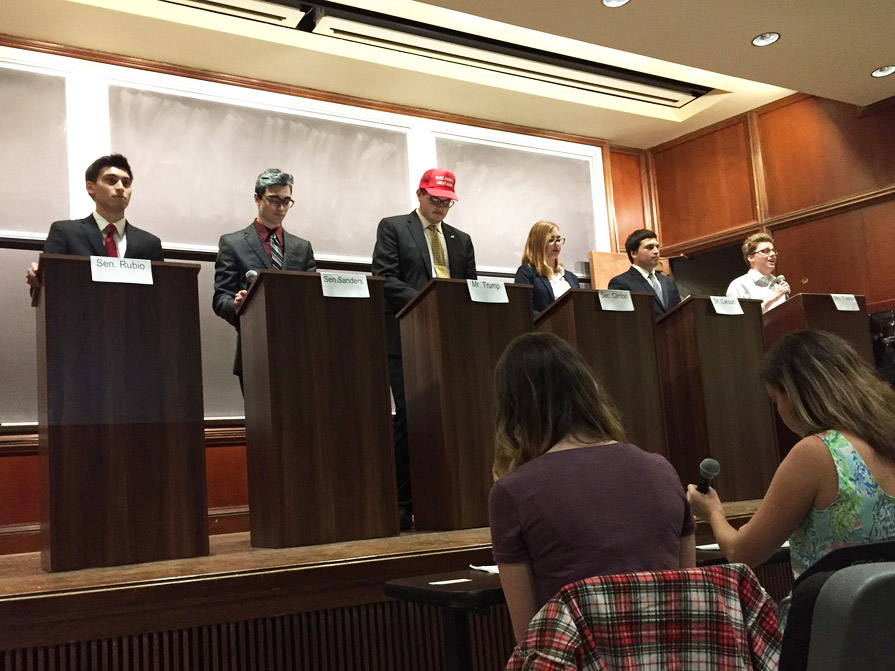The Quad: A long campaign season can save us from President Trump

Students portray presidential candidates at Bruins for Rubio mock debate on Nov. 18. (Ara Shirinian/Daily Bruin senior staff)
By Chris Campbell
Nov. 29, 2015 11:48 p.m.
“Everyone should get a bigger piece of the pie. Who doesn’t love pie? Who doesn’t love America?”
The line came from none other than Donald Trump – or at least an actor portraying the cantankerous mogul, along with other students portraying Marco Rubio, Bernie Sanders, Hillary Clinton, Ben Carson and Carly Fiorina at a mock debate hosted by Bruins for Rubio on Nov. 18.
But as the debate wore on, I could almost predict each candidate’s responses. Mock Clinton wriggled her way through questions about her email servers. Mock Carson and Mock-o Rubio battled for the title of Most Humble Backstory. And of course, Mock Trump dished out some entertaining Trumpisms.
Next to a pair of stick figures comparing Carson and Trump’s head sizes, I scribbled a note to myself, “I’m sick of these guys.”
Anyone following the news would be, too. After a summer of scandals and insurgencies, campaign drama has already reached a fever pitch.
No one will even cast a single primary ballot for another two months.
In the United States, Ted Cruz was the first to announce his presidential candidacy on Mar. 23, 2015. The general election will take place on Nov. 8, 2016. That’s a span of 596 days, or about 85 weeks. It’s almost eight times as long as Canada’s, a whopping 24 times longer than the UK, and 8.3 times longer than Kim Kardashian’s marriage to Kris Humphries.
The actual primary election process lasts from Feb. 3 to June 14 – a little over four months total. Each state holds its own contest during this time, and the winner of each contest wins a certain number of delegates. Under normal campaign rules, whoever has the most delegates at the end becomes the Republican presidential nominee. Which begs the question: Why do we have to deal with these guys for a year and a half?
After the debate, I gave the Bruins for Rubio moderators my awkward “I’m-a-Daily-Bruin-opinion-columnist-please-don’t-run-away-but-can-I-please-have-an-interview” spiel. It landed me an interview with Bruins for Rubio Events Director Kristyn Kotyza, a third-year political science student.
I asked her what she thought about our insanely long campaign cycle, and she immediately cracked a smile. “It’s important to vet any candidate seeking such an important office,” she said. “There needs to be a lot of dialogue so we can choose the strongest leader.”
She has a point. Long campaign seasons allow voters time to deliberate over their choices in a way that favors actual leaders over demagogues.
Case in point, look at the current Republican frontrunner. Let me say it right now: Donald Trump’s candidacy is a joke. But it’s a joke that’s gone too far.
So far, the bloviator-in-chief has seemingly defied the laws of political physics. It doesn’t matter if he’s running a blatantly racist, knee-jerk reactionary campaign that would have made George Wallace blush. He still has the support of about a third of Republican primary voters.
If the American election cycle were only three weeks, this could spell trouble.
Short election cycles work for other countries like the UK because its citizens have a more trust in their politicians than Americans. This discourages demagogues from jumping into elections and playing on voter’s anger and fear. When it does occur, it is usually not rewarded with votes. The right-wing United Kingdom Independence Party only won one seat in the British Parliament this year.
But in a less trusting political environment, demagogues posing as “honest outsiders” can play to a “throw the bums out” sentiment for their own political gain. Here in the U.S., the 15 Republican candidates are each trying to outdo each other to establish their anti-establisment bona fides. Even son and brother of former presidents Jeb Bush is making this appeal.
But all these competing candidates have fractured the sane anti-Trump majority, making him the automatic frontrunner. So, in our fractured, partisan state, we should be happy that we have a longer time to evaluate some of the more insane candidates.
Lower profile Republicans will drop out before or during that time as they see their presidential hopes dashed, and their supporters will coalesce around a stronger candidate. Trump could very well stay in the race all the way up until the Republican National Convention in July, when the presidential nominee is officially chosen. But unless he can win over the other candidate’s supporters – which seems increasingly unlikely given his scorched earth campaign style – he won’t be able to win enough delegates to claim the nomination.
What’s more, as the field narrows, high profile Republicans will feel more confident making endorsements, which are essential to a candidate’s burgeoning campaign. Considering that those aforementioned leaders are decidedly hesitant to make a bombastic buffoon like Trump the face of the Republican party, it’s a safe bet that’ll he’ll be left in the cold when endorsements really start rolling in.
And that’ll leave a stronger leader like Marco Rubio – although he’s had his own unsavory comments concerning the Middle East – or Jeb Bush – if he can finally get his campaign to stop imploding – to claim the party’s nod as they ride off to battle the forces of Hillary and the Democratic Party.
A short campaign season doesn’t give voters enough time to look past their own anti-establishment anger long enough to realize electing a demagogue won’t solve their problems. A long season gives them that chance and gives truly able and strong leaders more opportunity to win.
So yes, I’m already sick of these guys. But hey, it’s better to watch a half-baked reality TV star be mocked by a college students in a fake debate than to actually spend four years under his administration.

